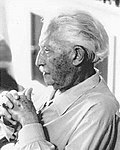Adult development
-
Erik Erikson
-
Older adults
-
Concerned older adult
-
Older adult exercising with tin can
-
Tai Chi exercises in Malacca
-
Taste testing cookie dough with grandmother
-
Nursing home
Adult Development[edit]
Adult development refers to the biological, psychological, and social changes that occur in human beings between the ages of 18 and the end of life. It is a complex process that encompasses a wide range of changes and adaptations as individuals progress through different stages of adulthood.
Biological Changes[edit]
During adulthood, individuals experience various biological changes. These changes can include the gradual decline in physical capabilities, such as reduced muscle mass, decreased bone density, and changes in metabolism. The aging process also affects the cardiovascular system, respiratory system, and immune system.
Early Adulthood[edit]
In early adulthood, which spans from approximately 18 to 40 years of age, individuals typically reach their peak physical performance. Physical fitness, reproductive health, and cognitive function are generally at their highest levels during this period.
Middle Adulthood[edit]
Middle adulthood, from about 40 to 65 years, is characterized by the onset of menopause in women and a gradual decline in testosterone levels in men. This stage often involves the beginning of age-related diseases such as hypertension and type 2 diabetes.
Late Adulthood[edit]
Late adulthood, which begins around age 65, involves more pronounced biological changes. Sarcopenia, osteoporosis, and cognitive decline are common. The risk of chronic diseases increases, and longevity becomes a significant focus.
Psychological Changes[edit]
Psychological development in adulthood involves changes in cognitive abilities, emotional regulation, and identity formation.
Cognitive Development[edit]
While some cognitive abilities, such as processing speed and working memory, may decline with age, others, like crystallized intelligence, often remain stable or even improve. Adults continue to develop problem-solving skills and wisdom.
Emotional Development[edit]
Adults typically experience improved emotional regulation and greater empathy. The development of a stable self-concept and self-esteem is crucial during this period.
Identity and Personality[edit]
Erik Erikson proposed that adults face the challenge of generativity vs. stagnation, where they strive to contribute to society and support future generations. Personality traits may become more stable, but significant life events can still lead to changes.
Social Changes[edit]
Social development in adulthood involves changes in relationships, family dynamics, and social roles.
Relationships[edit]
Adults form and maintain intimate relationships, including marriage and partnerships. The quality of these relationships can significantly impact mental health and well-being.
Family Dynamics[edit]
Adults often take on roles as parents or caregivers. The parenting experience can influence personal growth and development.
Career and Work[edit]
Career development is a significant aspect of adult life. Adults may experience career advancement, job satisfaction, and retirement planning.
Related Pages[edit]
| Development of the human body | ||||||||
|---|---|---|---|---|---|---|---|---|
|
Ad. Transform your life with W8MD's Budget GLP-1 injections from $75


W8MD offers a medical weight loss program to lose weight in Philadelphia. Our physician-supervised medical weight loss provides:
- Weight loss injections in NYC (generic and brand names):
- Zepbound / Mounjaro, Wegovy / Ozempic, Saxenda
- Most insurances accepted or discounted self-pay rates. We will obtain insurance prior authorizations if needed.
- Generic GLP1 weight loss injections from $75 for the starting dose.
- Also offer prescription weight loss medications including Phentermine, Qsymia, Diethylpropion, Contrave etc.
NYC weight loss doctor appointmentsNYC weight loss doctor appointments
Start your NYC weight loss journey today at our NYC medical weight loss and Philadelphia medical weight loss clinics.
- Call 718-946-5500 to lose weight in NYC or for medical weight loss in Philadelphia 215-676-2334.
- Tags:NYC medical weight loss, Philadelphia lose weight Zepbound NYC, Budget GLP1 weight loss injections, Wegovy Philadelphia, Wegovy NYC, Philadelphia medical weight loss, Brookly weight loss and Wegovy NYC
|
WikiMD's Wellness Encyclopedia |
| Let Food Be Thy Medicine Medicine Thy Food - Hippocrates |
Medical Disclaimer: WikiMD is not a substitute for professional medical advice. The information on WikiMD is provided as an information resource only, may be incorrect, outdated or misleading, and is not to be used or relied on for any diagnostic or treatment purposes. Please consult your health care provider before making any healthcare decisions or for guidance about a specific medical condition. WikiMD expressly disclaims responsibility, and shall have no liability, for any damages, loss, injury, or liability whatsoever suffered as a result of your reliance on the information contained in this site. By visiting this site you agree to the foregoing terms and conditions, which may from time to time be changed or supplemented by WikiMD. If you do not agree to the foregoing terms and conditions, you should not enter or use this site. See full disclaimer.
Credits:Most images are courtesy of Wikimedia commons, and templates, categories Wikipedia, licensed under CC BY SA or similar.
Translate this page: - East Asian
中文,
日本,
한국어,
South Asian
हिन्दी,
தமிழ்,
తెలుగు,
Urdu,
ಕನ್ನಡ,
Southeast Asian
Indonesian,
Vietnamese,
Thai,
မြန်မာဘာသာ,
বাংলা
European
español,
Deutsch,
français,
Greek,
português do Brasil,
polski,
română,
русский,
Nederlands,
norsk,
svenska,
suomi,
Italian
Middle Eastern & African
عربى,
Turkish,
Persian,
Hebrew,
Afrikaans,
isiZulu,
Kiswahili,
Other
Bulgarian,
Hungarian,
Czech,
Swedish,
മലയാളം,
मराठी,
ਪੰਜਾਬੀ,
ગુજરાતી,
Portuguese,
Ukrainian






